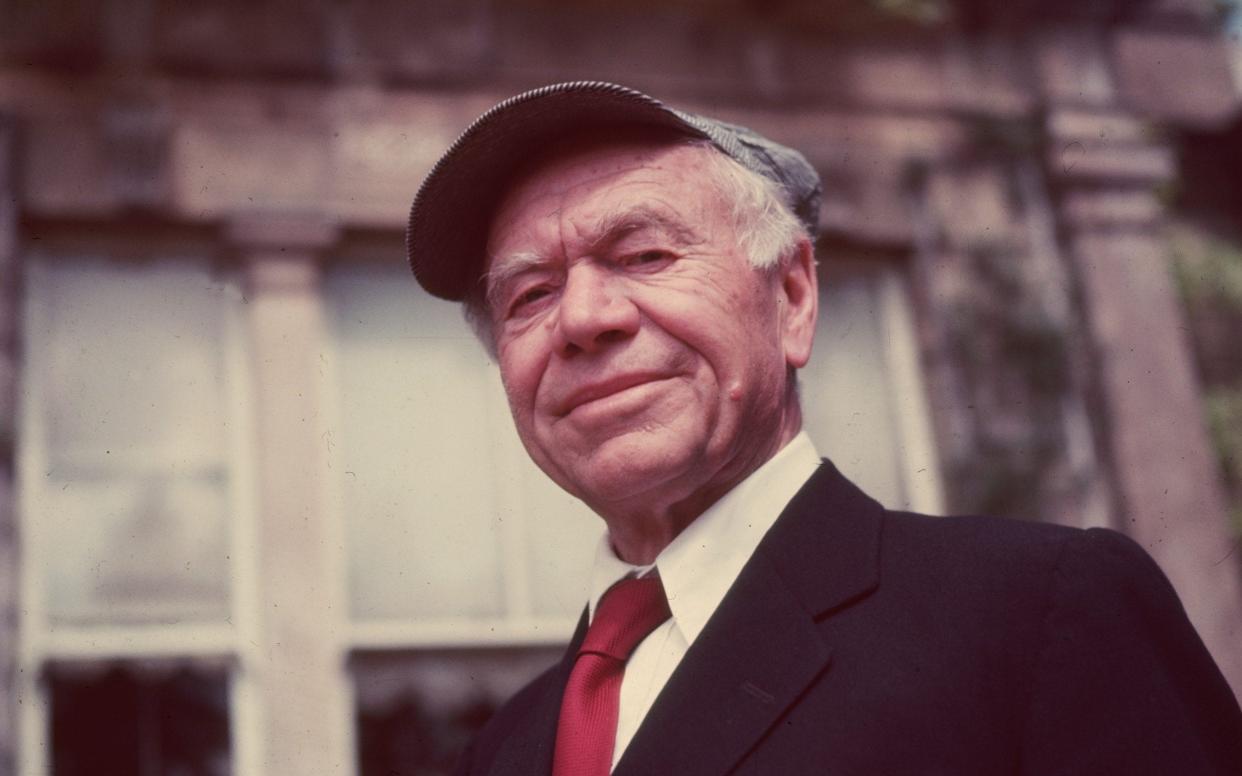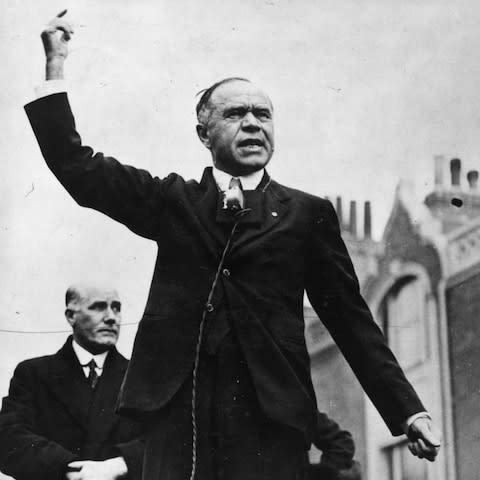Max Beaverbrook: press magnate, minister, ironclad monster

Lewis Jones reviews Max Beaverbrook: Not Quite a Gentleman by Charles Williams
Charles Williams’s new biography of the press baron Max Beaverbrook might more accurately have been subtitled Not Remotely a Gentleman. Margot Asquith identified him as “a vulgar Canadian of the lowest reputation”. Not only did he wear brown shoes with a blue suit, he was generally regarded as a thumping crook. Hugh Cudlipp, who worked for him on the Sunday Express, called him “tyrannous, vindictive and malicious”. He was a treacherous friend (“However dire the dangers of his enmity may be,” wrote Violet Bonham Carter, “they pale before the perils of his friendship”) and, according to this biography, “a hard and demanding sexual master”.
He was, though, extremely good at making money and friends. His approach to everything was purely transactional and he was truly an artist of the deal. As proprietor of the Daily Express, he even contrived to make a deal with the shrewd Lord Rothermere, owner of the rival Daily Mail, that allowed him to fund the Express with the Mail’s profits.
As a journalist, MP, newspaper owner and government minister, Beaverbrook was much given to “grand visions, potentially inspiring” – and constantly changing. The only fixed point was his devotion to the Empire, which Williams traces to his childhood, as Max Aitken, in ultra-loyalist New Brunswick, where his father, a Scottish émigré with an Old Testament beard, was a Presbyterian minister. Max was a wastrel youth, but on his 21st birthday, in May 1900, he had an epiphany. Over whisky by a campfire, he was inspired by his friends’ talk of business: “The idler became a demonic worker,” he later wrote, “the spendthrift a rigid economist”.
Over the next decade, he went on to make enormous amounts of money, in a series of complicated and probably shady deals involving cement and utilities, and in 1910 he moved to London to make even more. That year, supported by Rudyard Kipling, his fellow imperialist, he was elected Unionist MP for Ashton-under-Lyne. The next year, to howls of indignation from Canada, he was knighted, and in 1916 given a baronetcy. In 1917, Lloyd George, who owed Aitken a favour or two, recommended him for a peerage, and the King reluctantly agreed, creating him Baron Beaverbrook. Kipling designed him a coat of arms featuring two beavers.

He acquired newspapers with the same rapidity as he did titles: The Globe, the Daily Express, the Evening Standard, and in 1918 he launched the Sunday Express. He used them to shout his opinions, and to vilify anyone, even friends, who disagreed. Lord Birkenhead wrote to complain about David Low’s cartoons of him in the Standard: “I never had cause for grievance until you, a friend, allowed a filthy little Socialist to present me as a crapulous and corpulent buffoon.”
The Express ran an “Empire Crusade”, demanding a customs union with the Dominions and Dependencies, and in 1930 Beaverbrook launched the United Empire Party, which did not thrive.
His other, related, crusade was isolationism and appeasement, which he stuck with, in a treasonous manner, even after 1939. In Jan 1940, he met the Duke of Windsor at the house of Walter Monckton, who was so appalled by their conversation that he reported it to a friend in the Foreign Office, who circulated a memo to colleagues:
W.M. tells me that he was present at a frightful interview between the D. of W. and the Beaver two days ago. Both found themselves in agreement that the war ought to be ended at once by a peace offer to Germany. The Beaver suggested that the Duke should get out of uniform, come home and, after enlisting powerful City support, stump the country... he predicted that the Duke would have a tremendous success… This shows you what a menace the Beaver is.
The next year, Churchill sent him to Moscow to negotiate with Stalin, where everyone agreed that they got on famously. “Stalin and Max did everything two lovers can do except sleep together,” wrote Robert Bruce Lockheart, the journalist and spy, “and that only because too busy”.

The Russian war effort became the Beaver’s new crusade. Stalin, he told the House of Lords, would “go down in the long list of Russian heroes as Stalin the Great”. And he brazenly defended the show trials and purges: “It is now clear that the men who were shot down would have betrayed Russia to her German enemy.”
Ivan Maisky, the Russian Ambassador to Britain, noted in his diary that Beaverbrook’s attitude to Churchill was “very changeable: one day he might praise him as Britain’s greatest statesman, on another he might call him a ‘swindler’, ‘turncoat’ or ‘political prostitute’ ”. But Churchill loved Beaverbrook’s company, drank and joked with him and, despite constant operatic letters of resignation, gave him a series of ministerial appointments: aircraft production, information, supply.
Unwisely, he also put him in charge of his disastrous election campaign of 1945. Aneurin Bevan explained their relationship: “Well, you see it’s like this: it’s as if the old man had married an ’ore. He knows what she is but he loves her.”
Williams writes that Beaverbrook’s “love life (if it can be called that)… is not easy to disentangle”. But he does he best, devoting three chapters to it. They make squalid reading. His first wife, Gladys Drury, of Halifax, Nova Scotia, was 18 when she married him, aged 26. “Her figure was stocky rather than refined,” Williams ungallantly notes, “but she was (an important asset) even shorter than Beaverbrook himself”. Her sister, Helen, had a more refined figure, and by one account Beaverbrook seduced her, too, “and kept [her] financially dependent on him most of her life”.
Williams quite often refers to Beaverbrook’s “instinctive dislike of the English upper class”, but this did not extend to its female members. His name was “linked” to those of Bridget Paget, Daphne Weymouth, Sibell Lygon, Edwina Mountbatten, Gwen Ffrangçon-Davies and Doris Delevingne, who once declared that “an Englishwoman’s bed is her castle”. In 1919, Diana Manners wrote to Duff Cooper from the Paris Peace Conference about Venetia Montagu: “It’s a disgusting case – her face lights up when that animated little deformity so much as turns to her. [She and Beaverbrook] are living in open sin at the Ritz in a tall silk suite with a common bath…”

His first serious mistress was Jean Norton, whom he betrayed remorselessly during their 20 years together, and before her death replaced her with a younger model, Lily Ernst, the Viennese ballerina. Ernst rejected him when he shouted “bloody old Jew” at a beggar in Cannes, but he wore her down. “The best thing I knew about Max Beaverbrook,” said Michael Foot, “was that Lily Ernst truly loved him.” Of course, he did not love her back.
Clement Attlee is reported to have said that Beaverbrook was the only evil man he had met. This thorough biography leaves one in no doubt that he was an ironclad, ocean-going monster.
Max Beaverbrook: Not Quite A Gentleman is published by Biteback at £25. To order your copy for £20, call 0844 871 1514 or visit the Telegraph Bookshop

 Yahoo News
Yahoo News 
